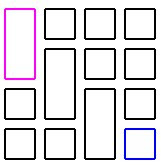
Table rendered using an automatically synthesized layout solver.
We picked attribute grammars as the basic specification language for our parallel browser layout language work. However, this begs the question: are attribute grammars expressive enough to actually handle layout languages?** Previously, we wrote (and automatically parallelized) various visualizations, so we know attribute grammar can be used for future languages. We're now going after the elephant in the room: CSS. As a fun start, Ras and I just put together an experience report about our successful experience with synthesizing an implementation of the 'automatic table layout' specification.
In short, it works. The table above was rendered using an automatically generated layout engine. Furthermore, our synthesizer found a multicore implementation for it. Neat :)
Stay tuned for more and we'll welcome any challenge problems :) Props to Ras, Matt, and Sam for help in revising that report!
**: More specifically, can we do this with statically scheduled attribute grammars? I'm distinguishing against 'demand-driven' and other approaches that essentially reduce to the Turing tar pit via general lazy functional programming.
No comments:
Post a Comment